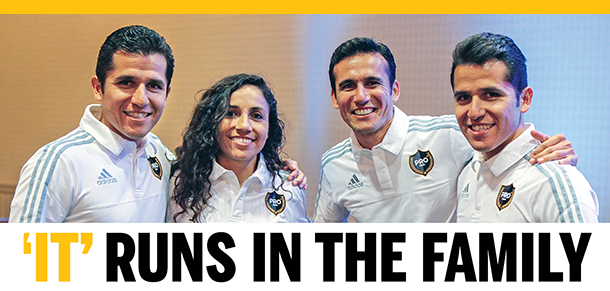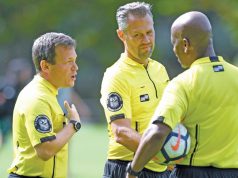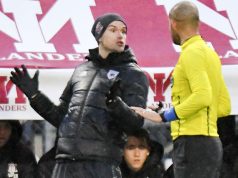Nestled between the San Diego Bay and the scenic splendor of the coastal mountain foothills in Southern California are the sprawling sun-kissed expanses of Chula Vista, Calif. Standing inconspicuously in a typical neighborhood lined with palm trees in the city is a home that was broken by definition, but beyond loving and warm by nature. And within its confines, a future first family of four soccer officials was nurtured by a single parent with an iron fist and a compassionate heart.
It was in a five-bedroom cream-colored house at 341 “L” Street where Luz Aurora Mariscal raised her four sons and one daughter as a single parent with all the conviction and love that flowed within her 5-foot-1 frame. Juggling career balls that involved cleaning houses, working with disabled children and taking on physical and occupational therapy, Luz was a master at maximizing the precious few hours of quality time she had with her children — Julian, Alejandro, Felisha, Eduardo and Apolinar. All five would grow into respected, productive, beloved adults under the guidance of this light-skinned woman who could communicate so much with just her brown eyes. And four of them would become elite professional officials, empowered by the excellence instilled into them by their mother.
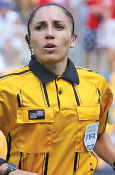 Alejandro on Felisha
Alejandro on Felisha
“Felisha has a unique personality. She has the perfect mix of tenacity, kindness and humor. She is a person with vision and persistence to achieve her goals. I could see these tendencies since we were children. She was the only girl in the family, so she would always follow along and wanted to play with us, the boys, regardless of the activity. Her competitive spirit would always show. … Felisha is a remarkably passionate person, always doing her best whether in sports, school, work, coaching or refereeing.”
Meet the Mariscals
Julian was the first born, arriving in 1979. He was the only Mariscal who did not pursue soccer officiating, opting instead to use his skills in another realm. He works as a welder and fitter for General Dynamics NASSCO, which designs and builds ships in San Diego.
“I think he was the most talented guy of all of us,” Eduardo said. “Everybody in the family thought he was the most talented and athletic.”
Alejandro, known to his siblings as Alex, followed in 1980. He was the first Mariscal to pursue soccer officiating, encouraged his siblings to follow his lead, and serves to this day as their mentor. He is perhaps the busiest of the four siblings, having worked in Major League Soccer, international friendlies, the North American Soccer League and the United Soccer League.
“I consider Alex to be the leader of our referee family,” Felisha said.
Felisha came along in 1982. Described by Alejandro as having “the perfect mix of tenacity, kindness and humor,” she has achieved the highest certification among her siblings. Ironically, Felicia, a FIFA International assistant referee who recently became eligible to officiate International Men’s Friendly matches, perhaps had the most difficult journey ascending through the officiating ranks.
The family was filled out in 1984 by twin brothers Eduardo and Apolinar, the latter of whom answers to Polo, and is the youngest by five minutes. They are certified to work MLS lines and continue to follow their older siblings to the top.
“With Apolinar and Eduardo being identical twins, when I see them for the first time, I wait until they are together to say hello and call them, ‘A&E,’” said Craig Lowry, who has worked with Alex as an MLS and PRO assistant referee and has trained Apolinar and Eduardo as U.S. Soccer ARs. “After speaking with them for a few minutes, I can tell who is who.”
All four have progressed to such an extent as officials that Nasser Sarfarez, director of referee instruction in Southern California, proudly notes, “The Southern California referee community realized that The Fabulous Four are here to stay.”
“It’s common to have two (siblings),” said Arturo Angeles, the California south director of instruction for referees and a national instructor and assessor for U.S. Soccer. “But to have four and to have them at the professional level is very rare. Four is highly, highly unusual.”
What elevates the Mariscals to even greater heights is the quality of human beings they are. That’s the one aspect that supersedes their officiating prowess.
“Immediately,” Lee Popejoy, a national instructor and assessor, answered when asked when he envisioned future elite status for the Mariscals as officials. “They’ve always been serious, they’ve always been focused, they’ve always asked questions, they always listened … they were people who really wanted to become involved. They did what you would expect a top-level student to do.”
A rush of words regarding the Mariscals come to mind for Dr. Herb Silva, a national referee instructor and assessor for U.S Soccer.
“When I think of the Mariscal officiating family,” he said, “the following observations come to mind: They are committed, professional, respectful, competent, humble, loyal, flexible, dependable, knowledgeable and trustworthy.”
Sandra Serafini, PRO women’s referee manager and former official, agrees that the Mariscals are special.
“They take the concept of sibling rivalry and completely turn it on its head,” Serafini said. “I’ve never seen a family that propels each other to be the absolute highest version of what they can be, whether that be with their fitness, their professionalism, their officiating, their careers, their lives.”
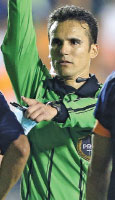 Felisha on Alejandro
Felisha on Alejandro
“Alex is always checking in with each of us, making sure we are OK and is always asking us how our games went, dissecting each play and call with us. Even though, the four of us were coaches at one point of our lives, I know that if I have questions about training or an injury, Alex is always there to reach out to for advice. He has a profound knowledge of sports injuries and has an incredible mind for sports science. He is a great older brother who is always looking after us on and off the field. After the passing of our father a year and half ago, Alex, along with our eldest brother Julian, was always there to ensure we were doing OK to get through that difficult and unsettling time in our lives. To this day he is still instrumental in helping us all process how to keep moving forward with the loss.”
Home Base
Their base was Luz. All her children responded to her unyielding insistence that there were always more gold nuggets of excellence to be chisled within the souls of each of them. She even questioned — and fully expected an answer — why the occasional A-minus one of them brought home couldn’t have been an A. She encouraged them to pursue high school sports and made an enormous daily commitment when Felisha, Eduardo and Apolinar went on to compete for international running legend Steve Scott at Cal State San Marcos. Nothing was too much for her kids.
“It was a very tight family,” Scott said. “In the early years, she would drive them to practice — and Chula Vista is a good hour’s drive away — and then drive home. And then she would come back and pick them up after practice in the evening and drive home again. So it was like four hours of driving a day.”
But then, Luz always went to great lengths for her children. To ensure her children were raised in a safe environment, Luz even bought a home one block east of Chula Vista High School to maximize their safety to the venue she deemed most essential in their lives. Education was everything to Luz. This is a woman who took pride in her work, however menial it could be, but damned if her children were ever going to scratch out a living, as her lot in life turned out to be.
“My mother, who only finished high school, managed to work three jobs to make sure we had everything we needed,” Eduardo said. “She always encouraged us to keep studying since she understood the struggles of working without a college degree.”
Throughout their pursuit of excellence, idyllic childhood memories linger for the Mariscal family. There are no ugly images of gangs infiltrating their streets as darkness descended. Fresh graffiti occasionally could be seen scrawled on some wall, but the city always seemed to have it painted it over by the following morning. Their high school exploits included soccer, basketball, boxing, volleyball, cross country and track, sports they managed to master while bringing home the straight-A grade reports that Luz expected.
“My mom has so many awards at home that she filled up a wall,” Alejandro said. “She kept all our trophies. Everyone was successful in athletics.”
The paradox is there wasn’t much to be found in the Mariscal household in terms of material possessions at the time voices of the Mariscal kids were echoing throughout the warm confines. But that never mattered. All that mattered was the bond that existed between the six inhabitants of 341 “L” Street and what a loving bond that was. Luz managed to scrape together just enough dollars to spring for a family trip to Disneyland every Christmas. There were the three movies for the price of one they would regularly watch together at The Vogue Theater in Chula Vista, with “Speed,” “Unbreakable,” “The Lion King” and “Dumb and Dumber” among the titles remaining prominent on their mental marquees.
On Dec. 31, the five children would routinely travel south of the border to celebrate the birthday of their father, Eduardo, a lawyer who remained a loving presence on the edges of their lives. Scores of cousins — “The last time I counted, we had 57,” Alejandro said — would also be on hand for the elder Eduardo’s birthday and the Mariscal clan has fond memories of bringing in the new year together within the Mexican border one day after their father’s birthday. The elder Eduardo, who died in September 2014, often traveled north to Chula Vista to be a face in the crowd during his children’s sporting events.
“My dad always tried to be there, at least in the big moments,” Alejandro said.
But if the elder Eduardo was a somewhat distant mentor, Luz was their compass. Her kids were raised with an enduring foundation, the basis of which could be found every Sunday morning at St. Rose of Lima Catholic Church, a mile north of their home.
“I wanted to teach them values, to have faith in God,” said Luz, who separated from the elder Eduardo in 1993 and then went through a divorce six years later. “I tried to set examples and we were a very united family. We would go to church as a family and we were always together at dinner time. I would bring them to houses I was cleaning and they would experience how hard it was. They needed to work to help at home.”
Luz wasn’t about to go through the motions as she carried out her exhausting professional housecleaning chores. As her children watched her carrying loads of laundry, triple-checking for one last speck of dust on a shelf and meticulously smoothing a bedspread until it was devoid of any wrinkles, the Mariscal children absorbed tendencies that they would one day apply to their soccer officiating careers.
“My mom was a very hard worker,” Apolinar said. “I think from a young age, we learned to value everything that we had. It was very limited and I knew that when my mom said, ‘Hey, you have to do your work, she was right. I could see her point. Even though we were very, very young, mentally, we were mature. It was never like, ‘Oh, she’s just being a mom.’ She was right.”
So when the day came when Luz informed her children they were old enough to take on jobs to help make ends meet, acceptance dwarfed any semblance of reluctance. Their time had arrived.
“My mother told my siblings and me that we either had to get a job at a fast food restaurant or start refereeing,” Eduardo said.
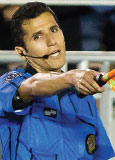 Apolinar on Eduardo
Apolinar on Eduardo
“When I think of my brother, Eduardo, the first thing that comes into my mind is persistency and work rate. Persistency and work rate have helped him accomplish many things. My brother understands that in life you will fail and it is OK if, and only if, you learn from your mistakes and keep moving forward. From what I remember, I have never seen him quit anything in his life. When my brother sets a life goal he likes to pursue it until accomplished.”
The Bond of Refereeing
Soccer officiating had been swirling the air for the Mariscal kids, all of whom excelled in the sport at Chula Vista, since 2000. That’s when Bob Flores, soccer coach at Southwestern Community College in Chula Vista, informed his players that officials in the area were needed. Alejandro, a 20-year-old member of the team, was one of those who listened with both ears.
“He would always encourage us to be immersed in the game,” Alejandro said of Flores. “He would encourage us to jump to the next level as players or become referees. There were three on the team who became interested and, of those three, I was the only one who kept refereeing.”
Alejandro, who was also making deliveries for Kentucky Fried Chicken at this time, didn’t like working in the food business and steered his younger siblings to concentrate on officiating. He was picking up speed on that same course, attending a clinic and qualifying as a Level 8 referee. On the recommendation of Popejoy, Alejandro was invited to a youth camp in the summer of 2001 and was seen by Heroes Baghoumian, former FIFA referee and Cal South State Youth Administrator. The following year, Felisha, Eduardo and Apolinar joined him and, by 2004, all four were invited to attend a youth regional in Hawaii. The family bond was as tight as ever as they elevated their respective skills to a new level.
“It was the first time all four of us got to travel together,” Eduardo said. “It was a wonderful experience, refereeing the best teams in Region 4. It definitely helped having my siblings along since it made us all stronger. We had the trust to talk about our doubts, weaknesses and uncertainties and we were able to bring ourselves up.
“Refereeing really helped us bond together even more because, in this job, you need a lot of support from loved ones. The fact that we were all referees made it more special since we were able to understand what we were going through.”
With that mutual understanding came an epiphany.
“The camp as a whole,” Felisha said, “inspired us to look beyond what initially got us started in refereeing and to set bigger goals for ourselves — the hope as professional referees that someday, we might be at the FIFA level to represent the United States at international tournaments.”
The four Mariscals consistently impressed their superiors with their professionalism, competency and command. Furthermore, they were at least as fit as the athletes they officiated, with Scott’s demanding practices having elevating their physical states to a new level.
“What soccer officials have to go through to get into shape is nothing compared to what I put them through,” Scott said. “I think it really prepared them for moving into that profession. They would not be afraid of anything that soccer would throw at them.”
Just ask Safarez.
“Progress on the field continued as the siblings impressed the referee leaders in all areas of youth, adult, collegiate and professional soccer to receive an increased number of invitationals to major events,” Sarfarez said. “All four were the prime example of what fitness means to a soccer referee at a high level when they effortlessly completed every possible fitness test.”
Like any official, each of the Mariscals experienced their growing pains. Ironically, it was Felisha, who has earned the highest qualification in her family to date, who endured the most as she ascended through the ranks. And this had nothing to do with her ability.
“After I graduated from youth games, I got more assignments to officiate men’s adult amateur leagues,” she said. “This was perhaps the most challenging aspect of refereeing yet. Every game was a constant struggle to keep the authority as the official in control. Many of the players and coaches doubted my ability to handle the pace and apply the Laws of the Game. On many occasions, they would remind me of my gender and try to perpetuate their own expectations of who should be officiating their games.
“After a few of these games, I would drive home frustrated, sometimes questioning and second-guessing if I should keep refereeing. During this point in my career, I wish I would have known that by going through this turmoil, I was molded into being a better referee physically, mentally and emotionally. I would have not been ready to do women’s or men’s professional games had I not been forced to meet with passionate players of this sort ahead of time.”
All four have arrived, bringing integrity and extreme competence to their assignments. The Marsicals have occasionally pooled their talents in various incarnations and their communication skills are something to behold. One example was June 11, 2011, when Alejandro, Eduardo and Apolinar worked a match together between Mexico Sub 22 and Venezuela in Las Vegas. Alejandro served as the center referee while Apolinar and Eduardo were the assistant referees.
“This was not an easy game to referee especially because both teams are really difficult to referee,” Eduardo said. “This game was a test for us as a family working together. We know each other so well that I knew my brothers knew what to expect from me and vice versa. There was complete trust and, even though the communication devices did not work as planned, it did not matter since my brother knew us so well and he was able to read our body language.
“This was the first time my mother came to see us referee and she had the biggest surprise because, no matter which referee the fans were yelling at, it was one of her children.”
Seventeen days later, on June 28, the Mariscals upped the ante to four of a kind when the three brothers and one sister officiated an Open Cup match between the Los Angeles Galaxy and the Orange County County Blues at Cal State-Fullerton. It was the only time to date that all four have shared a field in the realm of professional officiating and the communication that went on between them was almost worth the price of admission by itself.
“I had worked with them at times for exhibition matches or in adult and youth league games,” Felisha said. “Calling a match with my brothers seems to come easier as we can communicate easier using gestures, eye contact, head nods and other forms of body language since we know each other so well.
“In all our games, we are each other’s biggest support, source of critique and training ally. We make a point to watch each other’s games and scrutinize the breakdown afterward. Not a family function goes by when, inevitably, a careful analysis of refereeing soccer begins to surface.”
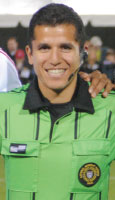 Eduardo on Apolinar
Eduardo on Apolinar
“Something I can say about my brother Polo is that he is grateful of the help we received and appreciative of those who gave us that help. Many of the people who helped us never realized what an impact they made. By helping one of us, all four benefitted. Polo feels that giving back to those in need is the best way to pay it forward. I see that it doesn’t matter how busy he is, he will always find a way to give a hand to a friend or someone in need, such as, free math tutoring or mentoring upcoming referees. The way Polo works with upcoming referees resembles the way he works with his math students; he treats both of his professions as an opportunity to help others succeed.”
‘The Best They Can Be’
It was all about achievement to the highest degree for these young adults. And as they ascended the ranks of officiating, they each fulfilled Luz’s desire to make something genuinely meaningful of their lives. Felisha teaches advanced placement Spanish at Chula Vista High School. Eduardo teaches mathematics at Mira Costa Community College and Polomar Collage. Apolinar also is a mathematics instructor at those two colleges as well as Cal State University. Even Alejandro, who centers his professional life on soccer officiating more than any of his siblings, doubles as a Spanish translator.
It’s called getting the most out of their lives, just as Luz consistently encouraged them to do. And the wisdom she has passed along burns brightly within each of her children, leaving a lasting impression on anyone with whom they cross paths.
“These young people have had such an outstanding support system since they were small,” said Sandra Hunt, national assessor and instructor for U.S. Soccer. “And it shows. When you meet them, they look you right in the eye. I assign them for college soccer and have worked with them for years as they worked their way up the professional ranks and they look you in the eye and shake your hand very firmly when you meet them. They have what we call, ‘It.’”
Popejoy routinely worked matches at Chula Vista when the Mariscals were in high school. What he remembers were gifted athletes with minimal ego but ample sportsmanship with the drive to succeed.
“They were at the top academically and they always supported each other,” Popejoy said. “I’ve been at games where one of them is refereeing and, after the game, they sit down in the stands, they talk about the game and things they can improve. They’re a positive family. They have a mother who required that they do the things they’re supposed to do as kids in a positive way. They accepted her 100 percent and they all worked together.”
Scott saw those same qualities when he coached Felisha, Eduardo and Apolinar at Cal State San Marcos. Not only could they handle everything this demanding coach threw at them in practice, they routinely gave him back so much change for each of the figurative dollars he invested in each of them.
“They never missed a workout,” he said. “They were just a very dedicated, hard-working bunch. They were dedicated to the classroom, dedicated to their running, dedicated to the team and just very, very nice people. We would go up to Mammoth Mountain (in Sierra, Nev.) before the cross country season started and they were always willing to help in the kitchen with anything that was needed. All the others would be horsing around, but they would always want to help and go above and beyond what was expected of them.”
And as all four continue to solidify their identities as professional soccer officials, they have each other to thank, not to mention that smallish woman with the enormous heart who made it all possible.
“I have been blessed to have my siblings as referees and to be able to referee with them,” Eduardo said. “We have pushed each other to become better referees. We have always been united and I believe that is what made us so strong throughout our careers. I thank my mom for a great deal of our success since she always supported us,”
Added Felisha, “My brothers grew up together not only as siblings, but also as athletes, students, coaches and as professional referees. We are each other’s best friend and I know I can count on any of them.”
And through it all, a tired mother who used to balance three jobs looks on with enormous pride, satisfied that all her sacrifices were worth the struggle.
“I am very, very proud of them,” Luz said. “I feel so happy. I think they turned out to be the best they could be. When people think about them, they like them. People tell me what they think of my children and all I can say is that I’m proud of them.”
What's Your Call? Leave a Comment:
Note: This article is archival in nature. Rules, interpretations, mechanics, philosophies and other information may or may not be correct for the current year.
This article is the copyright of ©Referee Enterprises, Inc., and may not be republished in whole or in part online, in print or in any capacity without expressed written permission from Referee. The article is made available for educational use by individuals.

